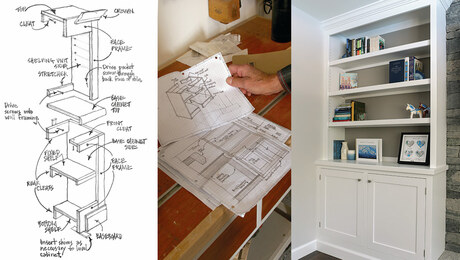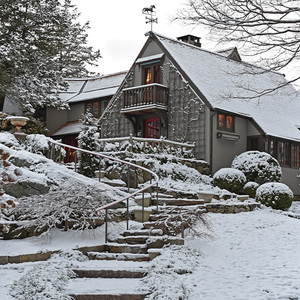My mission is to construct a wine “cellar” in a new house we are building for a client. It will be on the 2nd floor with 2 of the 6 planes adjoining unconditioned space (ceiling and 1 wall). It will have a steel door and the rest of the details are under discussion. I’ve read the specs from Rose Hill, Wine Enthusiast, and others and they seem to be tailored to a retrofit and impossible to execute properly (e.g. vapor barrier encasing studs-what about the plates?). Our insulation contractor is not helpful. The cellar will have a Whisperkool(?) unit. I’ve read Lstiburek’s stuff, but can’t understand it well enough to apply it to this application. Has anyone confidently built a “cellar” with similar requirements or can you point me to useful information?
Thanks















Replies
wine "cellar"
Looked at yur profile to see if this was in Yuma or Tucson, etc, where it may be advisable, and see this is your first post,
Welcome to BT. You will get some straightforward comments to your specific query, but will also get some like this <G> -- the last 2 paragraphs are serious though.
2nd floor, sure glad you put cellar in " ".
Just my opinion, but anyone's house I'd visit with a 'cellar' on the 2nd floor I'd consider someone with somewhat 'put-on' airs.
I'd pull up some old wine cellar columns from the Friday 'personal journal' in WSJ and try to talk the customer into building a real cellar, much more cachet!.
Plus, you could probably show them that with energy costs included, after about 12 years your install cost differentials for a true cellar would be lower than an artificial cellar. They would be happier in the long run and you would have more business.
bump
more opinions for the new guy on the block (OP)
Thanks for getting the discussion started. I don't know anything about posting to forums, chat rooms, etc. Nor do I understand the abbreviations. What is OP? The responses have been helpful. The one thing I know is that if you use CAPS, THEN YOU ARE YELLING.
Basic thing is your building a big built-in fridge. Wine room will be at 57 degrees f. Rest of the house between 66 and 76. Insulate the walls to work with this difference. The other wall and ceiling should be insulated to suit where they are. Ceiling attic I would add extra. In your case I would look at a split system so the room can be sealed fully. You will need a drain to the outside for the cooling unit.
Install lights that work in cool temps and have the switch with a tell light on the outside of the room. Steel door is not needed but the door you use should be insulated and weather sealed.
You could use foam panels to insulate over the studs to give even insulating. Vapor should not be a problem unless the wine is going to leak! You can plastic sheet the studs first if in doubt.
Basically you're making a walk-in cooler that will only be cooled to 50 degrees or so. No source of humidity inside it. The steel door is only for R-value and theft resistance I assume. We've done these before and one thing I was shocked by was the weight of a fully loaded rack of vino. Definitely a good idea to check the load re what the floor is currently rated for, may need to double a few floor joists under the racks that run parallel with the joists. It can be pretty shocking to ask about the dollar value of a fully loaded wine cellar. Easily a years pay for a guy like me. These guys track their wine inventory in Excel with tasting notes and so on.
Lstiburek is mostly giving advice on cooling things that breath and the assumption is that you would never need to heat a wine cellar (right?) so you can put the vapor barrier on the cellar side or on the attic side since there is nobody breathing out loads of humidity in a wine cellar. Gives the family a nice place to hang out in a hurricane or to wait out a home invasion. Definitely want a single cylinder lock on the door so you don't accidentally lock your self in with nothing to eat.
I'd build it like a safe room, sheath it with 1/2" ply and then 3" or so of foam board and the interior finish, T&G pine? or stucco?
------------------
"You cannot work hard enough to make up for a sloppy estimate."